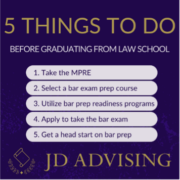What is the MEE?
What is the MEE?
What is the MEE? If you plan to take the Uniform Bar Exam (UBE) soon, then you probably already know that one of the three components of the UBE is the Multistate Essay Examination (or MEE). This posts summarizes the MEE format, the subjects it tests, and some of our best tips on acing the MEE portion of the UBE.
The MEE
The MEE consists of six, 30-minute essay questions and comprises 30% of the total UBE score. It tests all MBE topics plus some additional subjects (see below for more information!)
The MEE is meant to test an examinee’s ability to:
- (1) identify legal issues raised by a hypothetical factual situation;
- (2) separate material which is relevant from that which is not;
- (3) present a reasoned analysis of the relevant issues in a clear, concise, and well-organized composition; and
- (4) demonstrate an understanding of the fundamental legal principles relevant to the probable solution of the issues raised by the factual situation.
For each MEE, you will be given a hypothetical situation in which you need to spot legal issues, identify relevant information, and then present a well-reasoned analysis that shows you understand the legal principles in the fact pattern.
What states have adopted the MEE?
Any jurisdiction that administers the Uniform Bar Exam administers the Multistate Essay Exam as well. Here is a list of the jurisdictions that administer the Multistate Essay Exam portion of the bar exam:
Alabama, Alaska, Arizona, Arkansas, Colorado, Connecticut, District of Columbia, Hawaii, Idaho, Illinois, Iowa, Kansas, Kentucky, Maine, Massachusetts (beginning July 2018), Minnesota, Mississippi, Missouri, Montana, Nebraska, New Hampshire, New Jersey, New Mexico, New York, North Dakota, Oregon, Rhode Island, South Carolina, South Dakota, Utah, Vermont, Washington, West Virginia, Wyoming, Guam, Northern Mariana Islands, Palau, Virgin Islands
Subjects Tested on the MEE
The MEE tests a wide range of legal topics: this includes all MBE topics plus some additional ones. Some MEE questions may even test multiple areas of law. Some of the subjects that may be covered on the MEE include:
- Business Associations (Agency and Partnership; Corporations and Limited Liability Companies)
- Conflict of Laws
- Constitutional Law
- Contracts
- Criminal Law and Procedure
- Evidence
- Family Law
- Federal Civil Procedure
- Real Property
- Torts
- Trusts and Estates
- Uniform Commercial Code
Our Best MEE Study Tips
Now that you know the basic structure of the MEE and the legal subjects that may be tested, here are a few of our best tips that will help you ace the MEE.
1. Focus on the highly tested MEE subjects
A great way to maximize your chances of passing the MEE is to make sure you are well versed in the highly tested areas of law.
Certain subjects are tested very frequently on the MEE—for example, Civil Procedure is tested on almost every exam! In addition, other subjects that are tested frequently are Contracts, Corporations & LLCs, Agency and Partnership, and Secured Transactions. On the other hand, the least tested MEE subject is Conflicts of Law, which is also never tested by itself. So, while you certainly don’t want to completely ignore any MEE subject, spending more time studying the highly tested subjects is a good MEE strategy.
We’ve got a very detailed blog post that goes over the most highly tested MEE subjects that you can view here. We also outline MEE subjects by year in this post dating back to the February 2011 MEE.
2. Know how to properly structure an essay.
It is also essential to make sure you are able to correctly structure your essay answers.
Make sure your answers are clear and easy to read. If the essay asks three separate questions, then organize your answer with three separate, bold and underlined headings. You want to make it as easy as possible for the graders to read your answer and see you’ve answered all the questions!
Under each bold and underlined heading, answer the question in multiple short paragraphs. To start, the first paragraph should contain our rule. Then, the second paragraph should contain your analysis. Finally, the last paragraph should contain your conclusion. If you clearly follow “RAC” form (Rule, Analysis, Conclusion), it will make it super simple for the graders to see you connected all the dots and award you maximum points!
Remember bar exam essays are not law school essays, so if you can nail down a structure and a formula, you are more likely to succeed!
You can learn more on how to effectively structure a MEE answer in this blog post.
3. Self-grade your practice essays.
You’ve surely heard how important it is to do actual MEE practice questions. But simply writing out practice essays and skimming the model answer is not enough. You need get into the habit of grading your answers to see if you are right or wrong!
So how do you self-grade? Take your MEE answer and compare it to the model answer. The, make a note of anything you do consistently well. If you misstated the rule, write in the correct rule statement. Finally, if you made a mistake in your analysis, make note of your mistake and fix it.
Self-grading forces you to not just recognize your mistakes, but also take the time to actually fix them. When you actually take the time to think through why you made a particular mistake and then fix it, you’re less likely to make that same mistake again.
If you’d like more information on how to self-grade an MEE answer, check out this blog post.
Seeking MEE Expertise?
🌟 Freebies & Discounts
- Free Bar Exam Resource Center: Explore for leading guides, articles, and webinars.
- Expert-Crafted Bar Exam Guides: Unveil insights on high-frequency MEE topics and strategies for success.
- Free Webinars: Engage with top bar exam experts.
🔥 Top-Rated MEE Resources
- MEE One-Sheets: Boost your confidence with our most popular bar exam product!
- Bar Exam Outlines: Our comprehensive and condensed bar exam outlines present key information in an organized, easy-to-digest layout.
- NEW MEE Mastery Class: Unearth focused, engaging reviews of essential MEE topics.
- Bar Exam Crash Course and Mini Outlines: Opt for a swift, comprehensive refresher.
- MEE Private Tutoring and feedback: Elevate your approach with tailored success strategies.
- MEE Course: Preview our acclaimed five-star program for unmatched instruction, outlines, and questions.
🔥 NEW! Dive deep into our Repeat Taker Bar Exam Course and discover our unrivaled Platinum Guarantee Pass Program.




